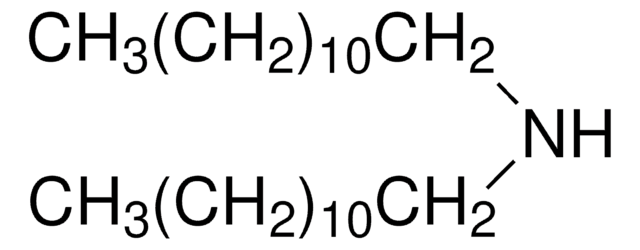T58009
Tridecylamine
98%
Synonyme(s) :
1-Aminotridecane
About This Item
Produits recommandés
Niveau de qualité
Pureté
98%
Point d'ébullition
265 °C (lit.)
Pf
30-32 °C (lit.)
Chaîne SMILES
CCCCCCCCCCCCCN
InChI
1S/C13H29N/c1-2-3-4-5-6-7-8-9-10-11-12-13-14/h2-14H2,1H3
Clé InChI
ABVVEAHYODGCLZ-UHFFFAOYSA-N
Vous recherchez des produits similaires ? Visite Guide de comparaison des produits
Application
- Dehydrogenation to nitriles catalyzed by ruthenium complex.
- Aerobic oxidation to carbonyl compounds catalyzed by vitamin C and Cu complex.
- Synthesis of alkylated 1,2,4-triazoles as bridging ligand in the preparation of polymeric 1-dimensional chains of iron(II) species.
- Synthesis of amphiphiles such as N-tridecyl-β-hydroxypropionic acid amide (THPA) and N-(β-hydroxyethyl)tridecanoic acid amide (HETA).
- As a ligand in the preparation of palladium-based catalyst, [PdCl2(TDA)2].
Mention d'avertissement
Danger
Mentions de danger
Conseils de prudence
Classification des risques
Acute Tox. 4 Oral - Aquatic Acute 1 - Aquatic Chronic 1 - Eye Dam. 1 - Skin Corr. 1B
Code de la classe de stockage
8A - Combustible corrosive hazardous materials
Classe de danger pour l'eau (WGK)
WGK 3
Point d'éclair (°F)
230.0 °F - closed cup
Point d'éclair (°C)
110 °C - closed cup
Équipement de protection individuelle
Eyeshields, Faceshields, Gloves, type P3 (EN 143) respirator cartridges
Faites votre choix parmi les versions les plus récentes :
Déjà en possession de ce produit ?
Retrouvez la documentation relative aux produits que vous avez récemment achetés dans la Bibliothèque de documents.
Notre équipe de scientifiques dispose d'une expérience dans tous les secteurs de la recherche, notamment en sciences de la vie, science des matériaux, synthèse chimique, chromatographie, analyse et dans de nombreux autres domaines..
Contacter notre Service technique











